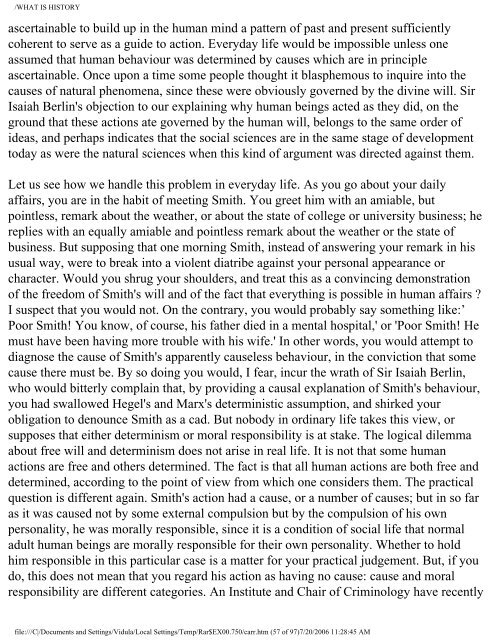What is History / by Edward Hallett Carr - Universal History Library
What is History / by Edward Hallett Carr - Universal History Library
What is History / by Edward Hallett Carr - Universal History Library
Create successful ePaper yourself
Turn your PDF publications into a flip-book with our unique Google optimized e-Paper software.
WHAT IS HISTORY<br />
ascertainable to build up in the human mind a pattern of past and present sufficiently<br />
coherent to serve as a guide to action. Everyday life would be impossible unless one<br />
assumed that human behaviour was determined <strong>by</strong> causes which are in principle<br />
ascertainable. Once upon a time some people thought it blasphemous to inquire into the<br />
causes of natural phenomena, since these were obviously governed <strong>by</strong> the divine will. Sir<br />
Isaiah Berlin's objection to our explaining why human beings acted as they did, on the<br />
ground that these actions ate governed <strong>by</strong> the human will, belongs to the same order of<br />
ideas, and perhaps indicates that the social sciences are in the same stage of development<br />
today as were the natural sciences when th<strong>is</strong> kind of argument was directed against them.<br />
Let us see how we handle th<strong>is</strong> problem in everyday life. As you go about your daily<br />
affairs, you are in the habit of meeting Smith. You greet him with an amiable, but<br />
pointless, remark about the weather, or about the state of college or university business; he<br />
replies with an equally amiable and pointless remark about the weather or the state of<br />
business. But supposing that one morning Smith, instead of answering your remark in h<strong>is</strong><br />
usual way, were to break into a violent diatribe against your personal appearance or<br />
character. Would you shrug your shoulders, and treat th<strong>is</strong> as a convincing demonstration<br />
of the freedom of Smith's will and of the fact that everything <strong>is</strong> possible in human affairs ?<br />
I suspect that you would not. On the contrary, you would probably say something like:’<br />
Poor Smith! You know, of course, h<strong>is</strong> father died in a mental hospital,' or 'Poor Smith! He<br />
must have been having more trouble with h<strong>is</strong> wife.' In other words, you would attempt to<br />
diagnose the cause of Smith's apparently causeless behaviour, in the conviction that some<br />
cause there must be. By so doing you would, I fear, incur the wrath of Sir Isaiah Berlin,<br />
who would bitterly complain that, <strong>by</strong> providing a causal explanation of Smith's behaviour,<br />
you had swallowed Hegel's and Marx's determin<strong>is</strong>tic assumption, and shirked your<br />
obligation to denounce Smith as a cad. But nobody in ordinary life takes th<strong>is</strong> view, or<br />
supposes that either determin<strong>is</strong>m or moral responsibility <strong>is</strong> at stake. The logical dilemma<br />
about free will and determin<strong>is</strong>m does not ar<strong>is</strong>e in real life. It <strong>is</strong> not that some human<br />
actions are free and others determined. The fact <strong>is</strong> that all human actions are both free and<br />
determined, according to the point of view from which one considers them. The practical<br />
question <strong>is</strong> different again. Smith's action had a cause, or a number of causes; but in so far<br />
as it was caused not <strong>by</strong> some external compulsion but <strong>by</strong> the compulsion of h<strong>is</strong> own<br />
personality, he was morally responsible, since it <strong>is</strong> a condition of social life that normal<br />
adult human beings are morally responsible for their own personality. Whether to hold<br />
him responsible in th<strong>is</strong> particular case <strong>is</strong> a matter for your practical judgement. But, if you<br />
do, th<strong>is</strong> does not mean that you regard h<strong>is</strong> action as having no cause: cause and moral<br />
responsibility are different categories. An Institute and Chair of Criminology have recently<br />
file:///C|/Documents and Settings/Vidula/Local Settings/Temp/Rar$EX00.750/carr.htm (57 of 97)7/20/2006 11:28:45 AM







